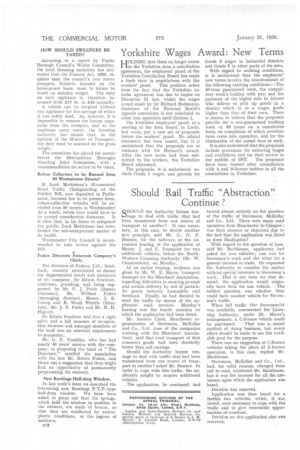Should Rail Traffic "Abstraction" Continue ?
Page 28

If you've noticed an error in this article please click here to report it so we can fix it.
Q1-10tiLD the Authority license tonkinage to deal with traffic that had been transferred from one source of transport to another? It was necessary, in this case, to decide another new principle, said Mr. G. H. P. Beames, for the railways, at the adjourned hearing of the app,lication of Messrs. J. and E. Transport for two additional vehicles, before the NorthWestern Licensing Authority (Mr. W. Chamberlain), on Monday.
At an earlier hearing, evidence was given by Mr. W. E. Macve, transport manager for the Bleachers' Association, regarding difficulties in securing prompt and certain delivery by rail of particular goods between Lancashire and Scotland. Finally, he had decided to send the traffic by means of the applicants' road services. Monday's hearing was the fourth occasion on which the application had been listed.
Mr. Andrew Clark, Manchester representative of Stevenson, McKellar and Co., Ltd. (one of the companies working with the Bleachers' Association), said that road transport of that concern's goods had been decidedly better than rail carriage.
Should the Authority license tonnage to deal with traffic that had been transferred from one source of transport to another? asked Mr. 13eames. In order to cope with this traffic, the applicants sought to acquire additional vehicles.
The application, he continued, had turned almost entirely on the question of the traffic of Stevenson, McKellar and Co., Ltd. There were many road operators from Manchester to Glasgow: was their absence as objectors Olte to the fact that the application wasdisted as from Haslingden?
With regard to the question of base, said Mr. Backhouse, applicants had asked for two vehicles; one was for Stevenson's work and the other for a general increase in. trade. He requested the Authority to consider the Matter without special reference to Stevenson's work. Had it not been for that demand, the application would originally have been for one vehicle. The further question was whether, they could have another vehicle for Stevenson's traffic.
When full traffic (for Stevenson's) was available, commented the Licensing Authority, under Mr. Macve's arrangernent, a C-licence vehicle could be purchased. That was a sound method of doing business, but every effort should he made to use the available pool for the purpose.
There was no suggestion of Cilicence vehicles taking the place of A-licence operation, in this case, replied Mr. Bathhouse.
Stevenson, McKellar and-Co., Ltd., had, for valid reasons, changed from rail to road, continued Mr. Bathhouse. but it was the increase for all the customers upon which the application was based.
Decision was reserved. .
Application was then heard for a further two vehicles, which,. it was stated, were necessary to cope. with. the traffic and to give reasonable opportunities of overhaul.
Decision on this application also was reserved.




















































































